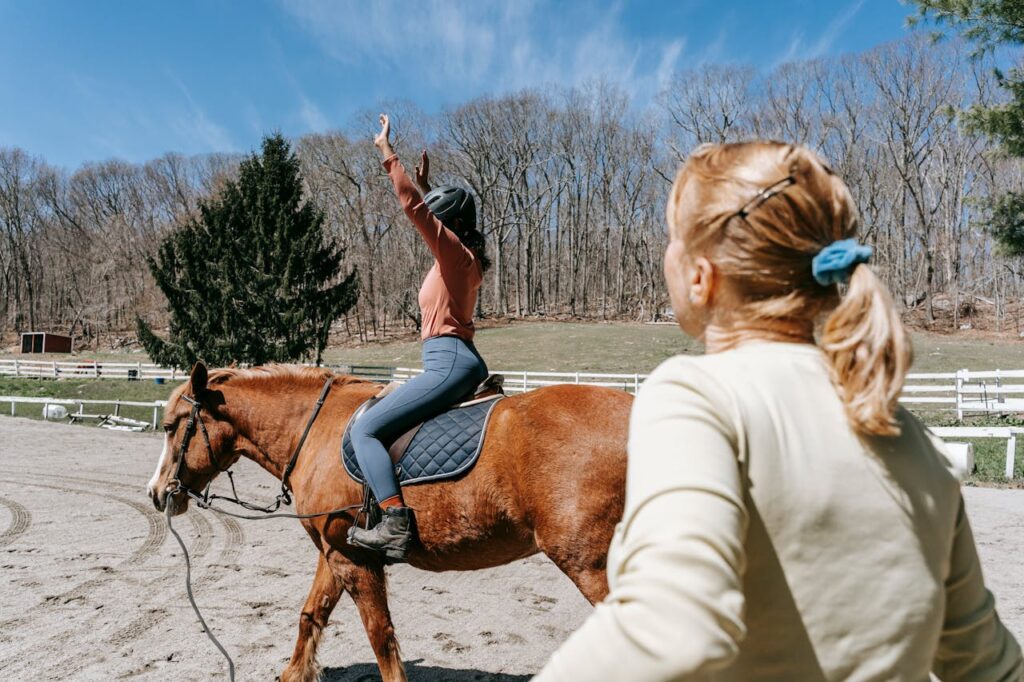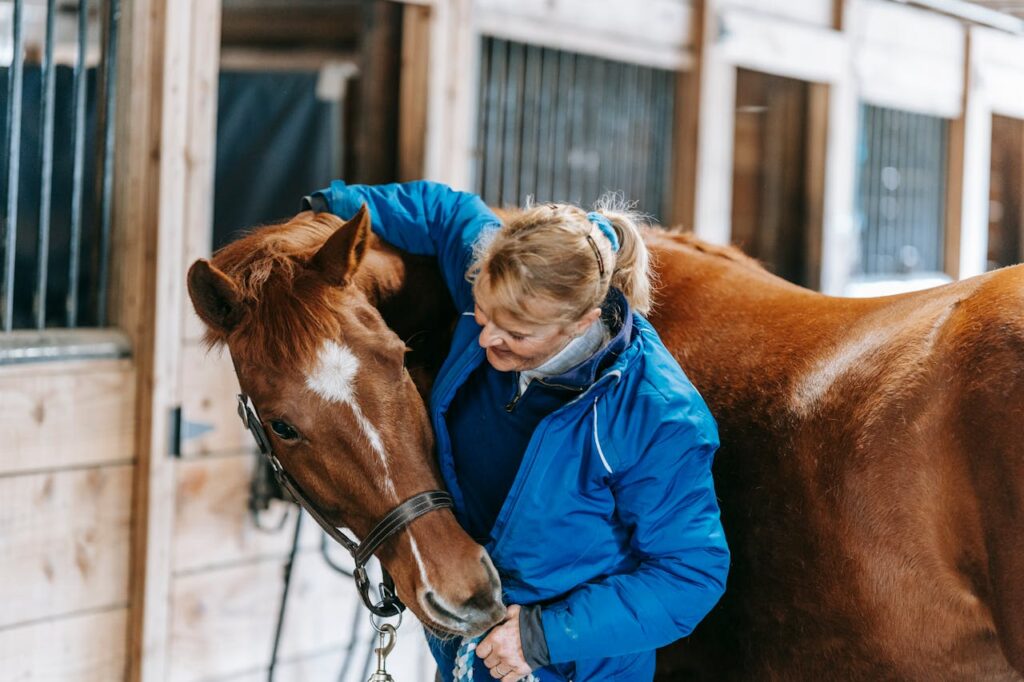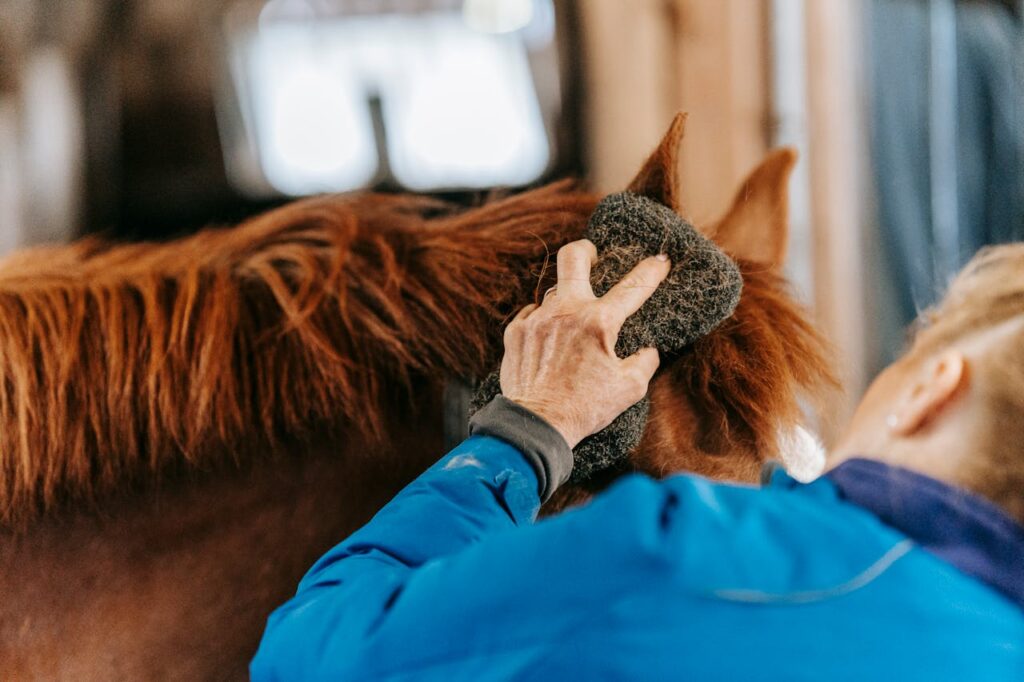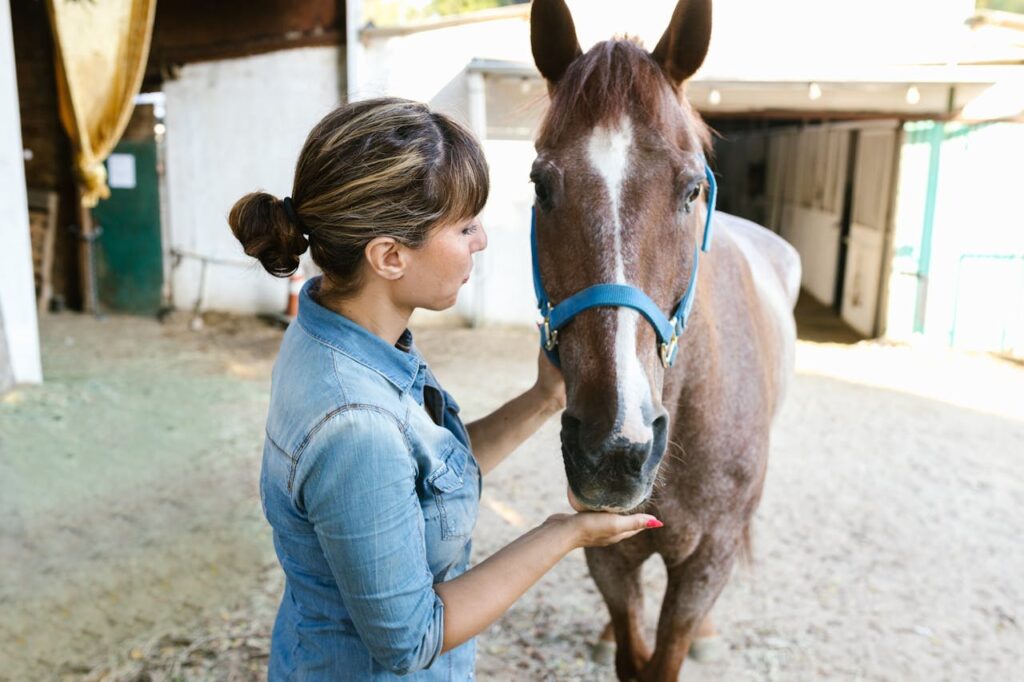The Holistic Benefits of Equine Therapy for Addiction

Some therapies feel like pressure. Others feel like permission. Equine therapy is the latter. Instead of sitting in a chair and digging up pain, clients at our Sun Valley rehab get to walk beside a horse in open space. There’s no rush, no spotlight—just calm presence and honest feedback. That makes a real difference in early recovery. The benefits of equine therapy for addiction include emotional stability, non-verbal healing, and improved relationships. For individuals who’ve struggled with addiction and mental health challenges, this form of therapy offers something powerful: a chance to grow without being judged, interrupted, or rushed.

How Does Equine Therapy Work for Addiction Recovery?
Sessions start with small tasks—brushing the horse, leading it around the arena, watching how it moves. Each step teaches something deeper. Clients observe the horse’s body language and get real-time emotional feedback. If they’re angry but smiling, the horse senses the tension. If they’re calm, the animal follows. These interactions go far beyond basic care.
They show people who they are when they’re not guarded. Inpatient detox San Fernando Valley programs help people stabilize physically, but emotional healing often takes longer. Equine therapy helps with that. It gives clients a way to test trust, control, and emotional honesty through action, not analysis. These aren’t metaphorical lessons. They play out in real time, making emotional insights harder to ignore.
Studies show that experiential therapies like equine therapy in Los Angeles improve client engagement by up to 30%. Many patients report feeling “seen” by the horse before they ever feel understood by a person. Sessions are usually 60–90 minutes, guided by professionals who observe both human and animal behavior. Over time, clients learn to shift their posture, breathing, and tone—not because they’re told to, but because they want the horse to trust them. That kind of change lasts.
Why Are Horses Chosen for Therapy Instead of Dogs or Other Animals?
Horses are prey animals. They survive by detecting subtle changes in their environment, especially emotional shifts in nearby humans. They sense heart rate, breathing patterns, and nervous energy. That makes them ideal partners in therapy. Relapse prevention program California clinicians use horses because they can mirror human behavior with honesty and no judgment. Unlike dogs, horses don’t offer unconditional affection. They respond to what’s real. That makes the feedback clearer—and sometimes harder to face.

For example, a person who’s nervous but trying to appear confident might see the horse stay distant. Another client, grounded and calm, will often have the horse approach willingly. These reactions make participants stop and reflect. They ask, “What am I feeling right now? What am I showing?” That kind of emotional insight is hard to get in traditional therapy, where people often intellectualize or deflect.
Research published in the Journal of Addictive Diseases found that horse-assisted therapy reduced resistance in adolescents by 26%, compared to standard talk therapy. Clients didn’t just attend more sessions—they actively participated. That kind of buy-in matters. Recovery isn’t about passive compliance. It’s about engaged healing. Horses help unlock that.
How Do Horses Help Regulate Emotions in Recovery?
Anxiety, fear, and overstimulation are common in early recovery. Brain chemistry is still unstable. Cortisol and adrenaline spike easily. That’s where horses come in. Simply walking beside a calm horse helps regulate breathing and heart rate. Brushing a horse lowers blood pressure. The barn’s quiet rhythm reduces overstimulation. Drug detox center Los Angeles programs manage withdrawal and stabilization. Equine therapy helps with everything after that. Clients learn to self-soothe by staying present with the animal—no screens, no drama, no distractions.
One study in Frontiers in Psychology showed that just 20 minutes of grooming a horse reduced cortisol levels by up to 27%. Participants described feeling “centered,” “calm,” and “safe.” That grounding effect creates space for reflection. It also helps prevent emotional hijacking—a state where clients react impulsively to stress, which often leads to relapse.
In practice, equine therapy sessions include breathing techniques, slow walks, and guided reflection on emotional states. These sessions don’t just teach coping—they practice it. Over time, clients gain the skills to manage triggers without substance use. Emotional stability becomes a learned behavior, not a lucky accident.

What Makes Horses Effective at Teaching Trust and Boundaries?
People in recovery often carry distorted views of relationships. Some have been betrayed. Others have betrayed others. Many never learned healthy boundaries. Horses won’t tolerate mixed signals. They demand respect and consistency. Alcohol detox Los Angeles helps clients regain their physical health, but equine therapy helps rebuild interpersonal trust. If someone pulls too hard on a lead rope, the horse stops. If they don’t assert themselves enough, the horse wanders. Clients quickly learn how their energy and behavior affect others.
These lessons go deeper than social skills. They teach emotional intelligence. Clients realize that clear boundaries don’t push people away—they build trust. Horses show that being present, honest, and respectful gets results. Over time, these insights transfer to human relationships. Parents reconnect with kids. Partners rebuild broken trust. Sponsors and therapists gain more honest engagement.
In group equine sessions, participants also practice peer boundaries. They learn to take turns, share space, and support each other’s experiences without control or competition. Those skills are essential for recovery. Sobriety doesn’t happen in isolation. It happens in relationships. Horses help build that foundation.
How Can Equine Therapy Support Dual Diagnosis Clients with Trauma or Mental Health Disorders?
Roughly 50% of people with substance use disorders also have co-occurring mental health issues like PTSD, depression, or anxiety. These conditions often stem from trauma. Talking about trauma too early can backfire. It overwhelms the client and retraumatizes them. Horses offer a different path. Residential treatment Los Angeles facilities use equine therapy to help trauma survivors feel safe again—without needing to tell their story out loud.
Clients who have been through abuse, war, or neglect often distrust people. But they can stand next to a horse. They can groom it, lead it, even cry beside it—and not feel judged or interrogated. That’s healing. Over time, the horse becomes a bridge. Some of the benefits of equine therapy for addiction clients include reconnecting with their bodies, learn to manage fear, and eventually feeling safe enough to engage in deeper therapeutic work.
Neuroscience backs this up. The presence of a calm animal activates the parasympathetic nervous system—the body’s natural calming response. This state supports trauma healing by lowering hypervigilance and allowing memory integration without emotional flooding. In short, equine therapy helps dual diagnosis clients heal where words fail.

What If Someone Doesn’t Like Traditional Therapy—Can This Still Work?
Some people don’t respond well to talk therapy. They shut down, get defensive, or feel exhausted by emotional probing. That doesn’t mean they can’t recover. It means they need a different route. Drug rehab centers in Los Angeles CA often recommend equine therapy for these clients because it works through action, not analysis. The horse doesn’t ask questions. It doesn’t interpret feelings. It just reacts to energy and behavior.
This simplicity appeals to many clients. They engage physically, not verbally. They begin to trust the process because they feel it is working. This shift from intellectualizing to experiencing is powerful. Clients who spent years in therapy without breakthroughs often make rapid progress in equine sessions.
One study from Health & Social Care in the Community found that participants in horse-assisted therapy reported greater self-awareness and emotional processing than in previous talk therapy experiences. That’s not an alternative—it’s an enhancement. It’s therapy in motion, and for many, it finally makes sense.
How Do Horses Teach Responsibility That Carries Over Into Sobriety?
Recovery takes routine. Showing up, keeping promises, doing what’s needed even when it’s hard. These aren’t personality traits—they’re habits. Equine therapy builds those habits. Cocaine addiction treatment Los Angeles programs often include structured tasks—feeding, cleaning stalls, preparing gear. These aren’t chores. They’re practice runs for life.
Clients learn that if they don’t refill the water bucket, the horse goes thirsty. If they don’t sweep the barn, someone else has to. These responsibilities aren’t negotiable, and they have visible consequences. That reality check translates to recovery. Forgetting a meeting affects others. Skipping meds has a cost. Sobriety isn’t about freedom—it’s about accountability. Horses teach that gently but clearly.
In many cases, these responsibilities reawaken a sense of purpose. Clients who felt useless now feel needed. That emotional shift—feeling useful instead of burdensome—often sparks long-term commitment to sobriety. Routine builds stability, and stability protects recovery.

What Daily Responsibilities Do Clients Practice During Equine Therapy?
Horses don’t take care of themselves—and that’s the point. In equine therapy, clients step into a caregiving role that mirrors the consistency and responsibility needed in recovery. These tasks are crucial for the animal’s well-being and, in turn, the client’s emotional development. Here are common responsibilities clients handle during equine therapy:
- Filling and checking water buckets — Horses need clean water at all times, teaching consistency and care.
- Preparing and delivering feed — Sticking to a feeding schedule instills time management and follow-through.
- Cleaning stalls and paddocks — Manual labor reinforces work ethic and attention to detail.
- Grooming and brushing — Builds connection and teaches calm, repetitive care.
- Leading horses safely — Requires awareness, respect, and non-verbal communication.
- Checking tack and gear — Promotes accountability and reinforces safety habits.
- Reporting observations — Clients track health or behavior changes, developing observation and communication skills.
- Working as a team — Cooperation with others in the barn fosters shared responsibility and social trust.
What Does the Research Say About Equine Therapy’s Impact?
Evidence continues to grow. Clinical studies show that equine therapy improves emotional regulation, treatment retention, and social functioning. A 2021 review in Substance Abuse: Research and Treatment noted that participants in equine-assisted programs had higher retention rates, up to 15% longer than those in standard treatment. That matters because longer stays often lead to better outcomes.
Clients in these programs also reported lower anxiety, increased motivation, and a stronger therapeutic alliance with providers. The benefits of equine therapy for addiction don’t end at the barn. They extend into the client’s daily life. Participants sleep better, communicate more clearly, and experience fewer behavioral outbursts.
At Tranquility Recovery Center, this therapy is an integrated part of care. Professionals track outcomes, observe patterns, and adjust the process as needed. This data-driven approach ensures that clients not only feel better but also get better.
Who Leads These Sessions—and Why Does That Matter?
Not every horse handler is a therapist, and not every therapist understands horses. Equine therapy requires both. Tranquility Recovery Center uses trained professionals who combine clinical skills with animal expertise. That dual training matters. Clients need someone who can interpret the horse’s behavior, reflect it back meaningfully, and keep the experience emotionally safe.
Sessions follow ethical guidelines. There are clear objectives, emotional check-ins, and follow-up discussions. Professionals observe the client’s tone, posture, and reactions—not to judge, but to understand. This reflection helps connect the dots between behavior and emotion. It also keeps the process grounded. Horses don’t replace therapy. They enhance it, and only skilled facilitators can bridge that gap effectively.
For trauma survivors, this safety is non-negotiable. Misreading a horse’s cue could reinforce fear instead of healing it. That’s why credentials and experience matter.

Why Does the Sun Valley Setting Matter in Equine Therapy?
Setting changes everything. A noisy, chaotic environment can derail recovery. A peaceful one supports it. Tranquility Recovery Center offers quiet trails, shaded arenas, and green space surrounded by nature. This calm setting reduces distractions and lowers stress hormones. Clients say they can breathe deeper. Their thoughts slow down. The body relaxes. That’s when therapy works best.
Noise and overstimulation often keep people in a reactive state. In Sun Valley, the environment does half the work. Just being near a horse in silence can calm a racing heart. No alarms. No concrete. Just soft soil, slow footsteps, and clear air. That shift allows emotional work to take root.
Research shows that access to green space improves mental health outcomes by up to 20%. Add horses to that, and you multiply the benefits of equine therapy for addiction. This setting isn’t decorative—it’s therapeutic. Clients don’t just survive in it. They reset.
Discover the Lasting Benefits of Equine Therapy for Addiction
Real recovery doesn’t just mean stopping use—it means learning how to live differently. That’s where the benefits of equine therapy for addiction stand out. At Tranquility Recovery Center, clients gain more than coping tools. They rebuild trust, regulate emotions, and take ownership of their growth—all while working side by side with horses in a peaceful, supportive setting.
This therapy isn’t a quick fix. It’s a grounded, practical way to address emotional wounds and behavioral patterns that traditional methods often miss. For many, it becomes the turning point—the moment when healing becomes real.
If you or your loved one is ready for a treatment approach that combines clinical care with hands-on healing, we’re here to help. Contact us today to learn more or get started with equine therapy at our Sun Valley rehab center.
You Have Questions
We Have Answers
At Tranquility Recovery Center, we offer treatment for a wide range of addictions, including alcohol, opioids, prescription drugs, and illicit substances. Our team tailors each program to meet individual needs, focusing on both the physical and emotional aspects of recovery.
At Tranquility Recovery Center, we offer treatment for a wide range of addictions, including alcohol, opioids, prescription drugs, and illicit substances. Our team tailors each program to meet individual needs, focusing on both the physical and emotional aspects of recovery.
At Tranquility Recovery Center, we offer treatment for a wide range of addictions, including alcohol, opioids, prescription drugs, and illicit substances. Our team tailors each program to meet individual needs, focusing on both the physical and emotional aspects of recovery.